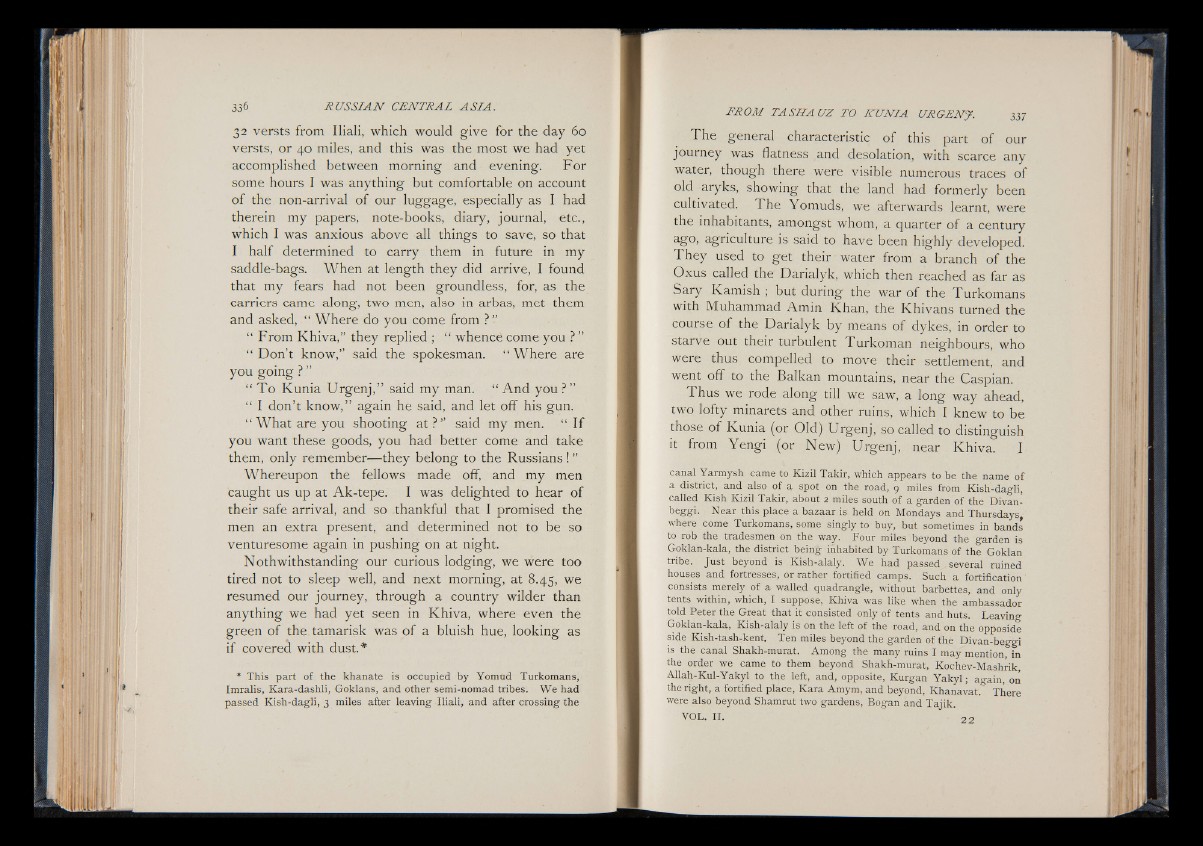
32 versts from Iliali, which would give for the day 60
versts, or 40 miles, and this was the most we had yet
accomplished between morning and evening. For
some hours I was anything but comfortable on account
of the non-arrival of our luggage, especially as I had
therein my papers, note-books, diary, journal, etc.,
which I was anxious above all things to save, so that
I half determined to carry them in future in my
saddle-bags. When at length they did arrive, I found
that my fears had not been groundless, for, as the
carriers came along, two men, also in arbas, met them
and asked, “ Where do you come from ? ”
“ From Khiva,” they replied ; “ whence come you ? ”
“ Don’t know,” said the spokesman. “ Where are
you going ? ”
“ T o Kunia Urgenj,” said my man. “ And you ? ”
“ I don’t know,” again he said, and let off his gun.
“ What are you shooting a t ? ” said my men. “ If
you want these goods, you had better come and take
them, only remember— they belong to the Russians ! ”
Whereupon the fellows made off, and my men
caught us up at Ak-tepe. I was delighted to hear of
their safe arrival, and so thankful that I promised the
men an extra present, and determined not to be so
venturesome again in pushing on at night.
Nothwithstanding our curious lodging, we were too
tired not to sleep well, and next morning, at 8.45, we
resumed our journey, through a country wilder than
anything we had yet seen in Khiva, where even the
green of the tamarisk was of a bluish hue, looking as
if covered with dust.*
* This part of the khanate is occupied by Yomud Turkomans,
Imralis, Kara-dashli, Goklans, and other semi-nomad tribes. We had
passed Kish-dagli, 3 miles after leaving Iliali, and after crossing the
The general characteristic of this part of our
journey was flatness and desolation, with scarce any
water, though there were visible numerous traces of
old aryks, showing that the land had formerly been
cultivated. The Yomuds, we afterwards learnt, were
the inhabitants, amongst whom, a quarter of a century
aff°> agriculture is said to have been highly developed.
They used to get their water from a branch of the
Oxus called the' Darialyk, which then reached as far as
Sary Kamish ; but during the war of the Turkomans
with Muhammad Amin Khan, the Khivans turned the
course of the Darialyk by means of dykes, in order to
starve out their turbulent Turkoman neighbours, who
were thus compelled to move their settlement, and
went off to the Balkan mountains, near the Caspian.
Thus we rode along till we saw, a long way ahead,
two lofty minarets and other ruins, which I knew to be
those of Kunia (or Old) Urgenj, so called to distinguish
it from Yengi (or New) Urgenj, near Khiva. I
canal Yarmysh came to Kizil Takir, which appears to be the name of
a district, and also of a spot on the road, 9 miles from Kish-dagli,
called Kish Kizil Takir, about 2 miles south of a garden of the Divan-
beggi. Near this place a bazaar is held on Mondays and Thursdays
where come Turkomans, some singly to buy, but sometimes in bands
to rob the tradesmen on the way. Four miles beyond the garden is
Goklan-kala, the district being inhabited by Turkomans of the Goklan
tribe. Just beyond is Kish-alaly. We had passed ^several ruined
houses and fortresses, or rather fortified camps. Such a fortification
consists merely of a walled quadrangle, without barbettes, and only
tents within, which, I suppose, Khiva was like when the ambassador
told Peter the Great that it consisted only of tents and huts. Leaving
Goklan-kala, Kish-alaly is on the left of the road, and on the opposide
side Kish-tash-kent. Ten miles beyond the garden of the Divan-beggi
is the canal Shakh-murat. Among the many ruins I may mention, in
the order we came to them beyond Shakh-murat, Kochev-Mashrik
Allah-Kul-Yakyl to the left, and, opposite, Kurgan Yakyl; again, on
the right, a fortified place, Kara Amym, and beyond, Khanavat. There
were also beyond Shamrut two gardens, Bogan and Tajik.
VOL. II. 22